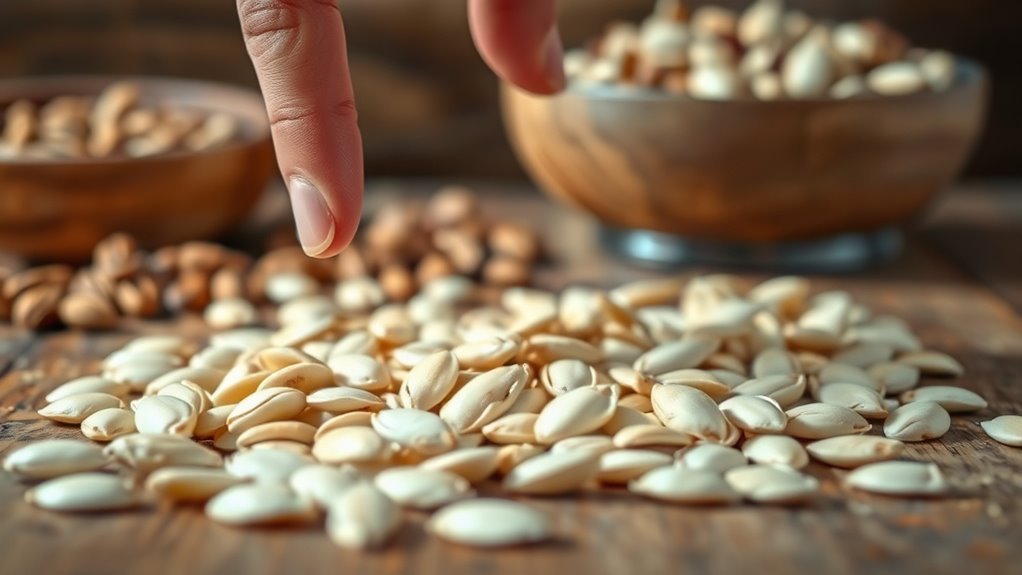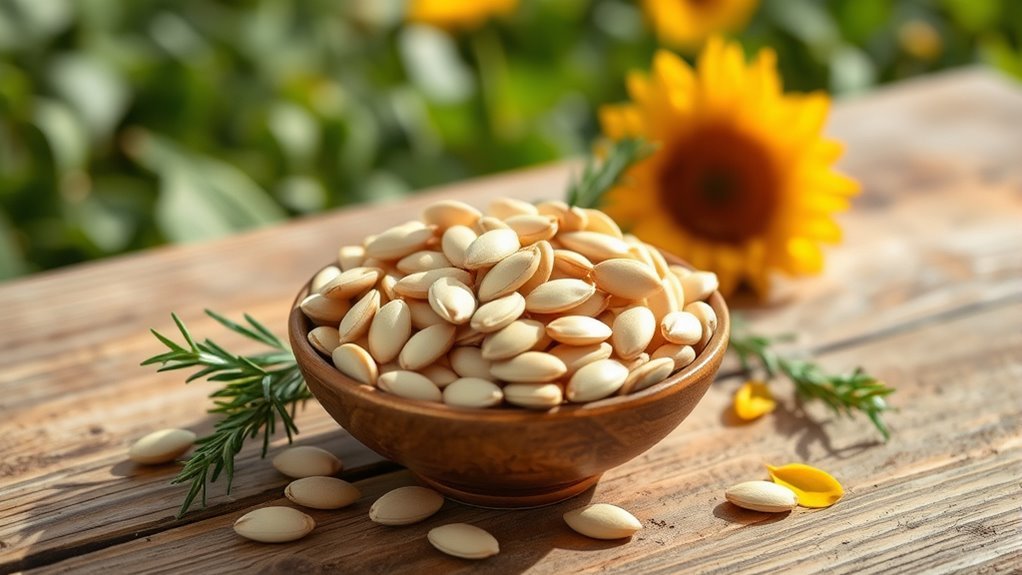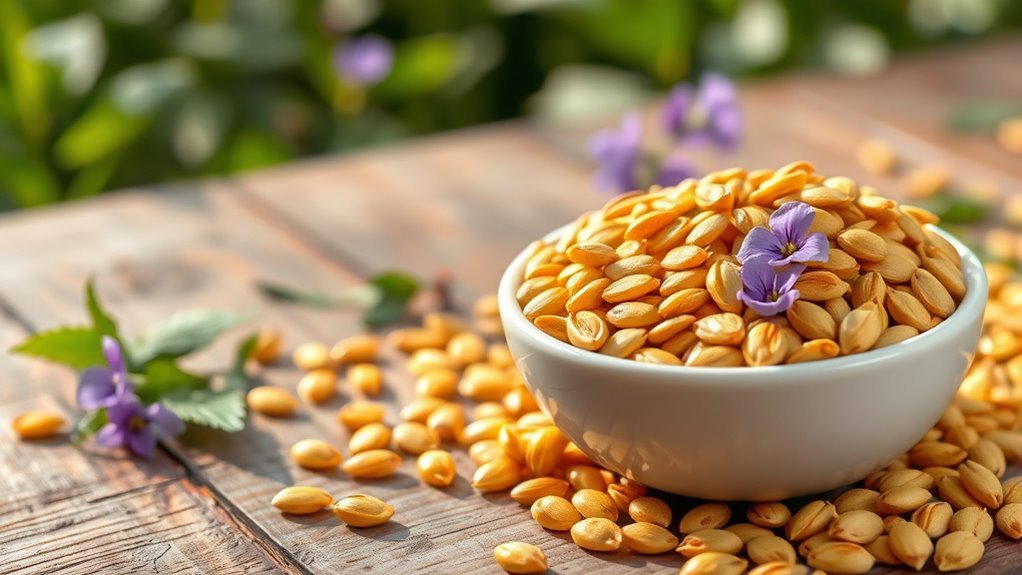Yes, sunflower seeds are keto-approved! They’re low in carbs, with just about 4g of net carbs per ounce, making them perfect for a keto diet. Packed with healthy fats, they also offer about 6g of protein per ounce, promoting satiety. Their rich nutritional profile includes vitamin E and essential minerals, contributing to your overall health. For tips on how to incorporate them into your meals or snacks effectively, you’ll want to explore more on this topic.
Nutritional Profile of Sunflower Seeds

Sunflower seeds offer a powerhouse of nutrients that can complement a keto diet. Packed with healthy fats, they provide a great source of energy while keeping carbs low. One of the standout sunflower seed benefits is their high vitamin E content, which supports skin health and helps protect your cells from oxidative stress. Plus, their antioxidant properties can contribute to reducing inflammation in the body. You’ll also find essential minerals like magnesium and selenium, which play crucial roles in bodily functions, including metabolism. Including sunflower seeds in your meals not only boosts flavor but also enriches your nutrient intake, making them a smart choice for anyone seeking freedom in their dietary choices while staying aligned with keto principles.
Carbohydrate Content Explained

When you look at the carbohydrate content of sunflower seeds, it’s important to take into account both the total carbs and dietary fiber. This breakdown helps you calculate the net carbs, which are vital for maintaining a ketogenic diet. Understanding these numbers can assist you in making informed choices about incorporating sunflower seeds into your meals.
Nutritional Breakdown Overview
For those following a ketogenic diet, understanding the carbohydrate content of sunflower seeds is essential. Different sunflower seed varieties and roasting methods can notably affect their nutritional profile. Here’s a quick breakdown:
- Raw Sunflower Seeds: Approximately 6g of total carbs per ounce.
- Roasted Unsalted Seeds: Similar to raw, but roasting may slightly alter carb content.
- Salted Roasted Seeds: Adds sodium but maintains a comparable carb level.
- Flavored Varieties: Watch out for added sugars that can increase carb counts.
Net Carbs Calculation
Understanding net carbs is essential for anyone on a ketogenic diet, as it directly impacts your daily carbohydrate intake. When calculating net carbs, you subtract fiber and certain sugar alcohols from the total carbohydrate count. For sunflower seeds, approximately 7 grams of total carbs per ounce can be reduced to about 4 grams of net carbs after accounting for fiber. This net carbs comparison helps you make informed choices. When considering seed selection, remember that not all seeds have the same carb content, so compare them wisely. Flaxseeds and chia seeds, for example, may offer lower net carbs than sunflower seeds. Staying aware of these details allows you to enjoy your snacks while remaining in ketosis.
Healthy Fats in Sunflower Seeds

Although many people associate healthy eating with avoiding fats, sunflower seeds offer a rich source of beneficial fats that can actually support a ketogenic diet. These seeds are an excellent dietary source of healthy fats, providing you with energy and essential nutrients. Here are a few benefits of the healthy fats found in sunflower seeds:
Sunflower seeds are a nutritious source of healthy fats that can support your ketogenic diet and boost energy.
- Monounsaturated Fats: Support heart health and lower bad cholesterol levels.
- Polyunsaturated Fats: Provide omega-6 fatty acids, which are vital for brain function.
- Vitamin E: Acts as a powerful antioxidant that protects your cells.
- Satiety: Help you feel full longer, making it easier to stick to your keto goals.
Incorporating sunflower seeds into your diet can enhance your overall fat intake while enjoying a delicious snack.
Protein Content and Its Benefits
Sunflower seeds not only provide healthy fats but also boast a notable protein content that can greatly benefit those on a ketogenic diet. With approximately 6 grams of protein per ounce, they serve as one of the excellent protein sources for keto enthusiasts. Including sunflower seeds in your diet can help support muscle maintenance and recovery, which is vital when you’re limiting carbohydrates. Furthermore, their protein content contributes to satiety, making it easier to manage cravings and maintain your dietary goals. Additionally, the essential amino acids found in sunflower seeds support overall health benefits like improved immune function and better energy levels. So, if you’re seeking a nutritious snack, sunflower seeds can be an empowering choice on your keto journey.
Vitamins and Minerals Found in Sunflower Seeds
Sunflower seeds are not just a tasty snack; they’re packed with essential vitamins and minerals that can enhance your overall health. You’ll find key nutrients like vitamin E, which supports immune function, and magnesium, crucial for bone health. Understanding the nutritional profile of sunflower seeds can help you make informed choices in your keto diet.
Nutritional Profile Overview
Packed with essential nutrients, sunflower seeds are a great addition to a keto diet. Different sunflower seed varieties offer diverse health benefits, making them a versatile snack. Here’s a quick overview of their nutritional profile:
- Vitamin E: A powerful antioxidant that supports skin health.
- Magnesium: Important for muscle function and energy production.
- Copper: Essential for red blood cell formation and iron absorption.
- Selenium: Plays a significant role in metabolism and thyroid function.
Incorporating sunflower seeds into your meals can enhance your nutrient intake while keeping your carb count low, aligning perfectly with your keto lifestyle. Enjoy them raw, roasted, or added to salads for a crunchy boost!
Key Vitamins Explained
Incorporating sunflower seeds into your diet not only boosts your nutrient intake but also introduces a variety of vitamins and minerals that are beneficial for overall health. These seeds are rich in essential vitamins that support several bodily functions.
| Vitamin | Functions | Sources |
|---|---|---|
| Vitamin E | Antioxidant, skin health | Sunflower seeds, nuts |
| Vitamin B1 | Energy metabolism, nerve function | Whole grains, seeds |
| Vitamin B6 | Protein metabolism, brain health | Fish, bananas, seeds |
Essential Minerals Present
When it comes to nutrition, minerals play a crucial role in maintaining overall health, and sunflower seeds are a fantastic source. These tiny powerhouses contain essential minerals that aid in mineral absorption, supporting various bodily functions. Here are some key minerals found in sunflower seeds:
- Magnesium – Important for muscle function and energy production.
- Phosphorus – Crucial for bone health and DNA synthesis.
- Copper – Supports iron metabolism and immune function.
- Selenium – Acts as an antioxidant and helps regulate thyroid function.
Different seed varieties may offer varying mineral content, so it’s worth exploring options. By incorporating sunflower seeds into your diet, you can enjoy their health benefits while staying aligned with your keto lifestyle.
How to Incorporate Sunflower Seeds Into Your Keto Diet
Although you might think of sunflower seeds as a simple snack, they can actually play a significant role in your keto diet. You can easily incorporate them into your meals for added flavor and nutrition. Here are some ideas:
| Snack Ideas | Meal Toppings |
|---|---|
| Roasted sunflower seeds | Salads with sunflower seeds |
| Sunflower seed butter | Avocado toast with seeds |
| Trail mix with seeds | Stir-fries topped with seeds |
| Seed bars | Soups with a sprinkle of seeds |
| Yogurt with seeds | Omelets enriched with seeds |
Use sunflower seeds as a crunchy addition to your yogurt or salads, or blend them into smoothies for a nutrient boost. Enjoy the freedom of creating diverse and satisfying meals while sticking to your keto lifestyle!
Potential Health Benefits of Sunflower Seeds
Sunflower seeds are more than just a tasty addition to your meals; they also offer a range of health benefits that align well with a keto lifestyle. Here are some potential advantages you might enjoy:
Sunflower seeds not only enhance your meals but also provide numerous health benefits that complement a keto diet.
- Rich in Antioxidants: They contain vitamin E and other antioxidants that help combat oxidative stress.
- Heart Health: The healthy fats in sunflower seeds can support cardiovascular health by lowering bad cholesterol levels.
- Anti-Inflammatory Properties: These seeds can reduce inflammation, which is vital for overall wellness.
- Nutrient Dense: Packed with magnesium, selenium, and fiber, they provide essential nutrients that support energy levels and digestion.
Incorporating sunflower seeds into your diet could be a simple yet effective way to boost your health while enjoying tasty snacks.
Portion Control and Serving Suggestions
While incorporating sunflower seeds into your keto diet can be beneficial, it’s essential to practice portion control to reap the most rewards without overindulging. A typical serving size is around 1 ounce, or about 28 grams, which contains roughly 6 grams of carbohydrates. Sticking to this serving size helps you enjoy the nutritional benefits—like healthy fats and protein—without exceeding your carb limits. To keep it interesting, consider adding sunflower seeds to salads, yogurt, or keto-friendly trail mixes. You can also sprinkle them on top of dishes for added crunch. Remember, moderation is key, so measure out your servings to avoid mindless snacking. With mindful portion control, you can savor the freedom of enjoying sunflower seeds while staying on track with your keto goals.
Frequently Asked Questions
Can Sunflower Seeds Cause Weight Gain on a Keto Diet?
Sunflower seeds can contribute to weight gain on a keto diet if consumed in excess, but they’re also beneficial for weight management when eaten in moderation. They’re high in healthy fats and protein, which can keep you full longer. Just be mindful of portion sizes, as their calorie density can add up quickly. Balancing them with other low-carb foods can help you enjoy their benefits without derailing your weight goals.
Are Roasted Sunflower Seeds Healthier Than Raw Ones?
Roasted sunflower seeds can be healthier than raw ones, depending on your preferences and nutritional goals. Roasting enhances flavor and can make them easier to digest, but it may also reduce some nutrients, like certain vitamins. Both cooking methods offer nutritional benefits, including healthy fats, protein, and fiber. If you’re looking for a crunchy snack, consider roasted seeds, but don’t overlook the raw ones for their fresh, natural taste and nutrient density.
How Do Sunflower Seeds Compare to Other Keto Snacks?
Sunflower seeds are a fantastic keto snack, offering impressive nutritional benefits. With a serving size of about 1 ounce, they provide healthy fats, protein, and fiber, making them a great alternative to typical low-carb snacks. Compared to other options like cheese or nuts, sunflower seeds pack a punch in vitamins and minerals while being lower in carbs. So, why not enjoy the satisfying crunch and health boost they bring to your keto journey?
Can Sunflower Seed Butter Be Used in Keto Recipes?
Yes, you can definitely use sunflower seed butter in keto recipes! It offers several sunflower seed benefits, like being low in carbs and high in healthy fats, making it a great alternative to traditional nut butters. You can incorporate it into smoothies, baked goods, or as a spread. Just keep an eye on portion sizes to maintain your carb limits. Enjoy experimenting with this versatile ingredient while sticking to your keto goals!
Are There Any Allergens Related to Sunflower Seeds?
Sunflower seeds can trigger allergies in some people, creating a reaction that feels like a storm brewing inside. If you’re sensitive, you might experience symptoms like itching or swelling. There are cross-reactivity risks, especially if you’re allergic to other seeds or nuts. It’s wise to consult with a healthcare professional if you suspect allergies. Staying informed will help you navigate your options and enjoy your snacks without fear.
Frequently Asked Questions about Sunflower Seeds and Keto
1. Are sunflower seeds keto-friendly?
Yes, sunflower seeds are generally considered keto-friendly. They are low in carbohydrates and high in healthy fats, making them a suitable snack for those following a ketogenic diet. A typical serving of sunflower seeds contains around 6 grams of carbs, with a significant portion of those being dietary fiber, which can be subtracted from the total carb count.
2. How many carbs are in sunflower seeds?
One ounce (approximately 28 grams) of unsalted sunflower seeds contains about 6 grams of total carbohydrates, with around 2 grams of fiber. This means that the net carbs are about 4 grams per ounce, which is quite low and fits well within the daily carb limits for a keto diet.
3. What are the nutritional benefits of sunflower seeds?
Sunflower seeds are rich in healthy fats, particularly polyunsaturated and monounsaturated fats. They also contain essential nutrients such as vitamin E, magnesium, selenium, and B vitamins. These nutrients contribute to heart health, improved skin health, and overall well-being, making sunflower seeds a nutritious addition to a keto diet.
4. Can I eat sunflower seeds on a strict keto diet?
Yes, you can eat sunflower seeds on a strict keto diet, but portion control is essential. While they are low in carbs, it’s easy to overeat them, which can lead to exceeding your daily carb limit. A standard serving size of about 1 ounce is generally recommended to keep your carb intake in check.
5. How can I incorporate sunflower seeds into my keto meals?
You can incorporate sunflower seeds into your keto meals in various ways. They can be added to salads for extra crunch, mixed into yogurt or smoothies, or used as a topping for casseroles. Additionally, sunflower seed butter can be a great alternative to other nut butters and can be spread on low-carb bread or used in keto-friendly recipes.
References
- https://www.healthline.com/nutrition/keto-diet-foods#nuts-and-seeds
- https://www.ncbi.nlm.nih.gov/pmc/articles/PMC6460761/
- https://www.washingtonpost.com/food/2020/01/30/what-is-keto/
- https://www.medicalnewstoday.com/articles/323037
- https://www.researchgate.net/publication/327169183_Nutritional_Analysis_of_Sunflower_Seeds
- https://www.webmd.com/diet/obesity/what-is-the-keto-diet
- https://www.cdc.gov/healthyweight/healthy_eating/index.html
- https://www.choosemyplate.gov/food-groups/protein-foods.html


